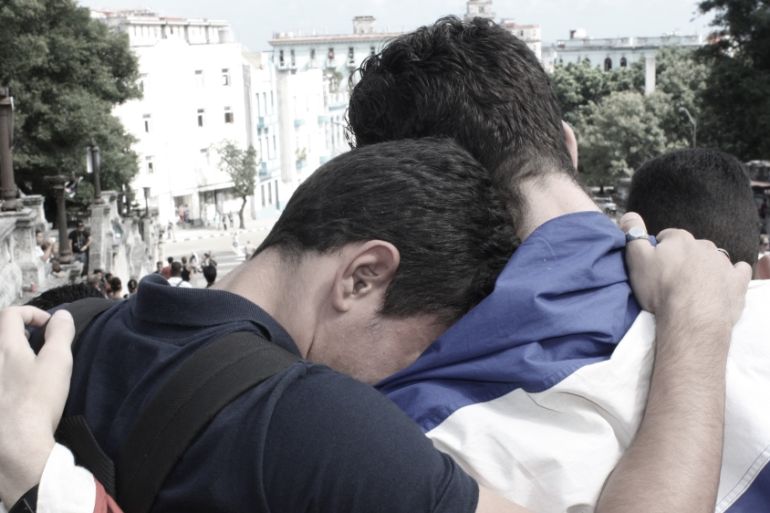In Cuba, a day without Fidel Castro
The streets and parks of Havana are quiet, but when people talk there is only one topic to discuss.

Havana, Cuba – A pink 1953 Chevrolet slides down San Lazaro Street in central Havana. There are five people, plus the driver, inside the taxi. On the front seat, a couple, who must be over 50, are hugging. In the back, a 32-year-old woman rests her head on the shoulder of her 65-year-old mother.
The Cuban musician Silvio Rodriguez is playing on the radio. Nobody talks. It is November 26, 2016, and these are the first hours of the Cuban revolution without Fidel Castro.
Keep reading
list of 4 itemsWhat’s going wrong in Cuba? | Start Here
Cuba has a new leader and it’s not a Castro
A new era in Cuba?
The 54-year-old taxi driver, Antonio, has hypertension, triggered when his wife woke him with a cup of coffee and the news of Castro’s death, he says.
“People may or may not sympathise with him and his ideas, but Cuba is Fidel; he put us on the map,” Antonio reflects.
The previous day, Antonio had gone to bed at 10pm. A couple of hours later, Cuban television had transmitted a message from Raul Castro, the president of Cuba, announcing the death of his brother, Fidel, the former president and the leader of the Cuban revolution.
Many people only learned of his death at dawn.
In the early hours of the morning, the streets are empty, silent. Only the murmur of televisions transmitting a special programme can be heard.
INTERACTIVE – Castro: The making of a legend
Near the polling station in Vedado, where Fidel used to vote and just metres away from one of his temporary residences, Cuban flags hang from some of the balconies, fluttering in the wind.
Central and Old Havana are busier than Vedado. There are people walking the streets, going about their daily routines.
![At the University of Havana, students and professors come together to pay tribute to Fidel [Armando Franco/Al Jazeera]](/wp-content/uploads/2016/11/24de05ecde1c448fb3d5ebb13c821fba_18.jpeg)
On his balcony overlooking Amistad Street, above the Palermo bar, 78-year-old retired architect Heberto Suarez has put up an old poster of Fidel and a tiny Cuban flag.
“Maybe we thought this day would never come, but we are already living it,” he says. “Many people wanted it because they think things are going to change. But people do not know that Cuba does not change and that the only one who could play with her [Cuba] was Fidel.”
A couple of blocks from Heberto’s house, past the boulevard of San Rafael, about five police patrols are parked in a row. “They have been there since dawn,” Heberto says. “In that building, live dissidents and they are surely watching that they do not go out into the street to make a mess and to scream nonsense.”
Just in front the boulevard of San Rafael is the Central Park, but nobody here is talking about baseball or basketball today.
Sitting on a bench, one man says to another: “I had to leave the house; I could not stand the antenna [the illegal signal of foreign channels], I don’t understand how people in Miami are celebrating his death.”
A woman, who is passing by, stops to say “He who celebrates death will have his punishment,” before continuing on her way.
READ MORE: Memories of a young Cuban revolutionary
A 35-year-old man in a cap, who asks not to give his name, says: “My condolences to the friends of Fidel Castro. I do not like Communism nor him, but you have to admire him. I was in prison for 16 years and I do not hold a grudge against him. He is the greatest one.”
An old man who has been quiet until now, speaks up: “When Hitler died, when Stalin died, when Lenin died, all his rivals formed a party, and that is why in Miami they are playing tumbadoras now.”
The man in the cap replies: “That’s from cockroaches, cowards, because they could not defeat him in life. Look, I do not like Fidel, but nobody can take away his achievements; the guy confronted Batista with wooden guns and stone guns and seized power. “
At the University of Havana, students and professors come together to pay tribute to Fidel. In the middle of the staircase, the students shout slogans like “you hear, you feel, Fidel is present” and sing the national anthem. Many are crying.
Outside the Faculty of Law, where Fidel was once a student, photographs recalling his student days have been displayed.
As afternoon settles, there is a stillness in the streets. On 11th Street, the sound of a drum can be heard.
A man dressed in white, wearing a green and yellow cap, leaves the house where the sound is coming from, looks up at the sky and then quietly says “Iború iboya Fidel”, which means safe trip in Yoruba, before making the sign of the cross and walking away.
![In the early hours of the morning, the streets are empty, silent. Only the murmur of televisions transmitting a special programme can be heard [Armando Franco/Al Jazeera]](/wp-content/uploads/2016/11/7635d6fb5bb04df6980f0c28c2d52e69_18.jpeg)